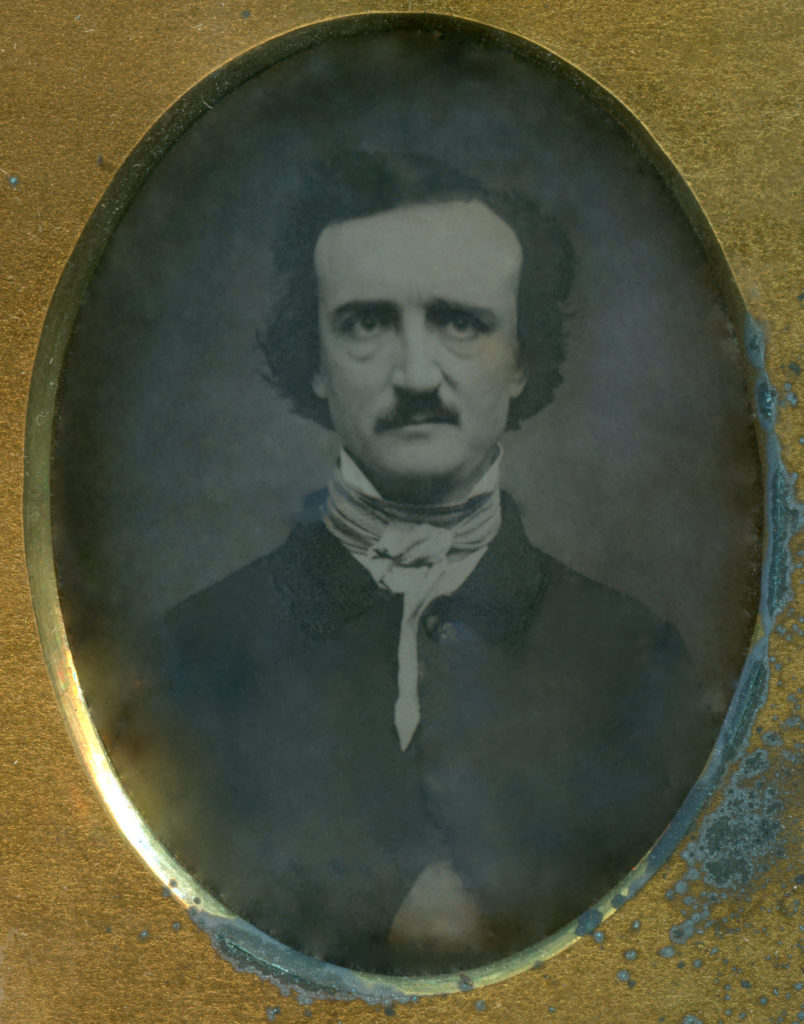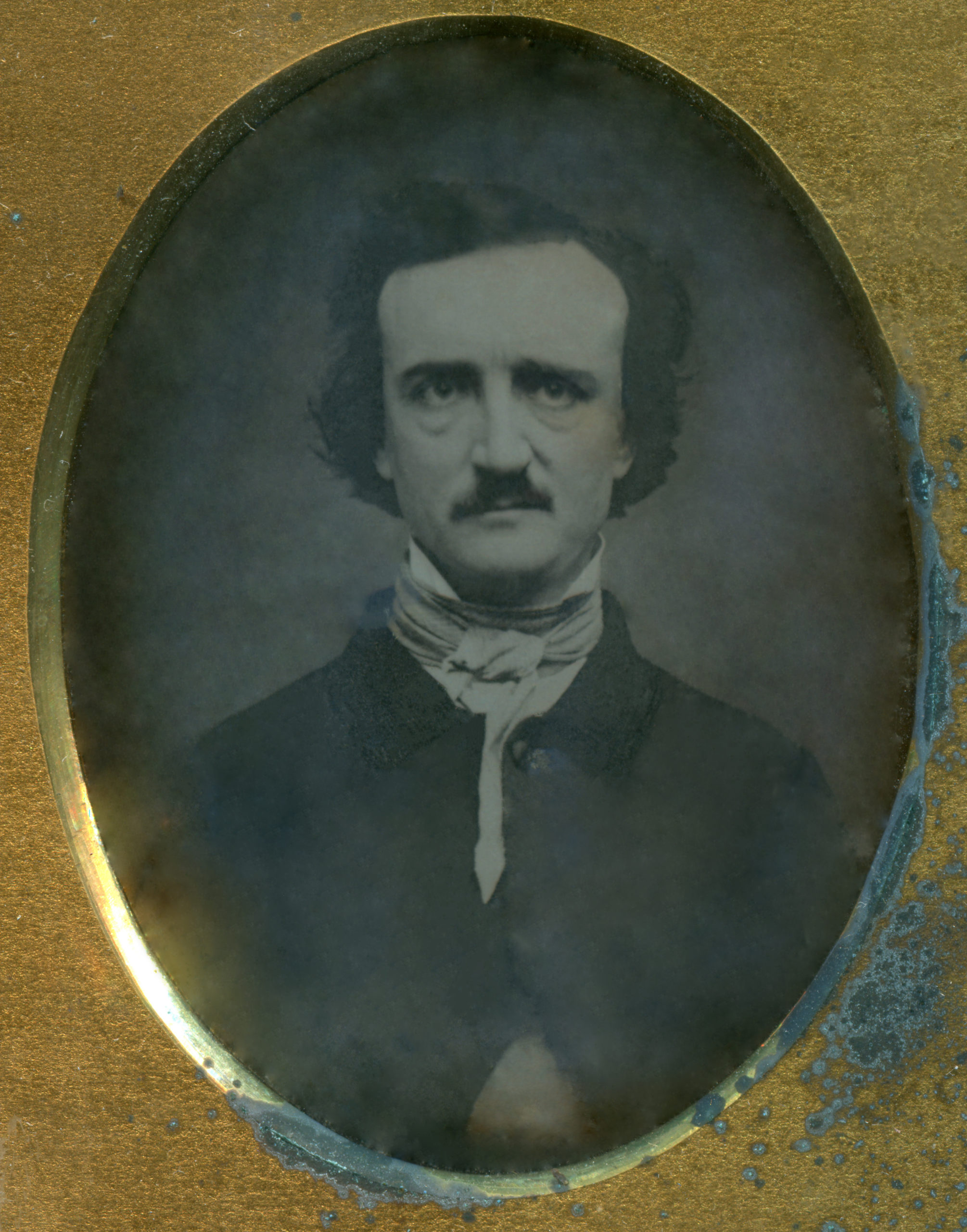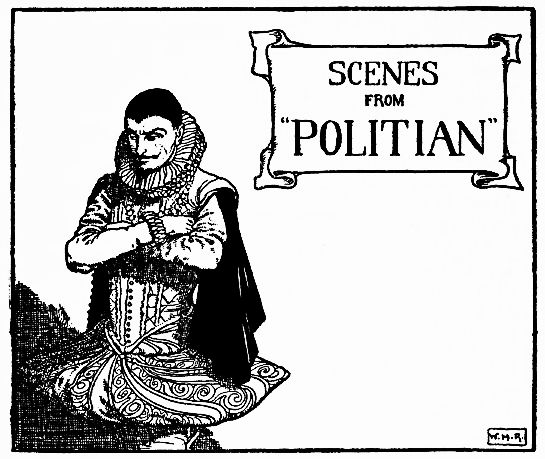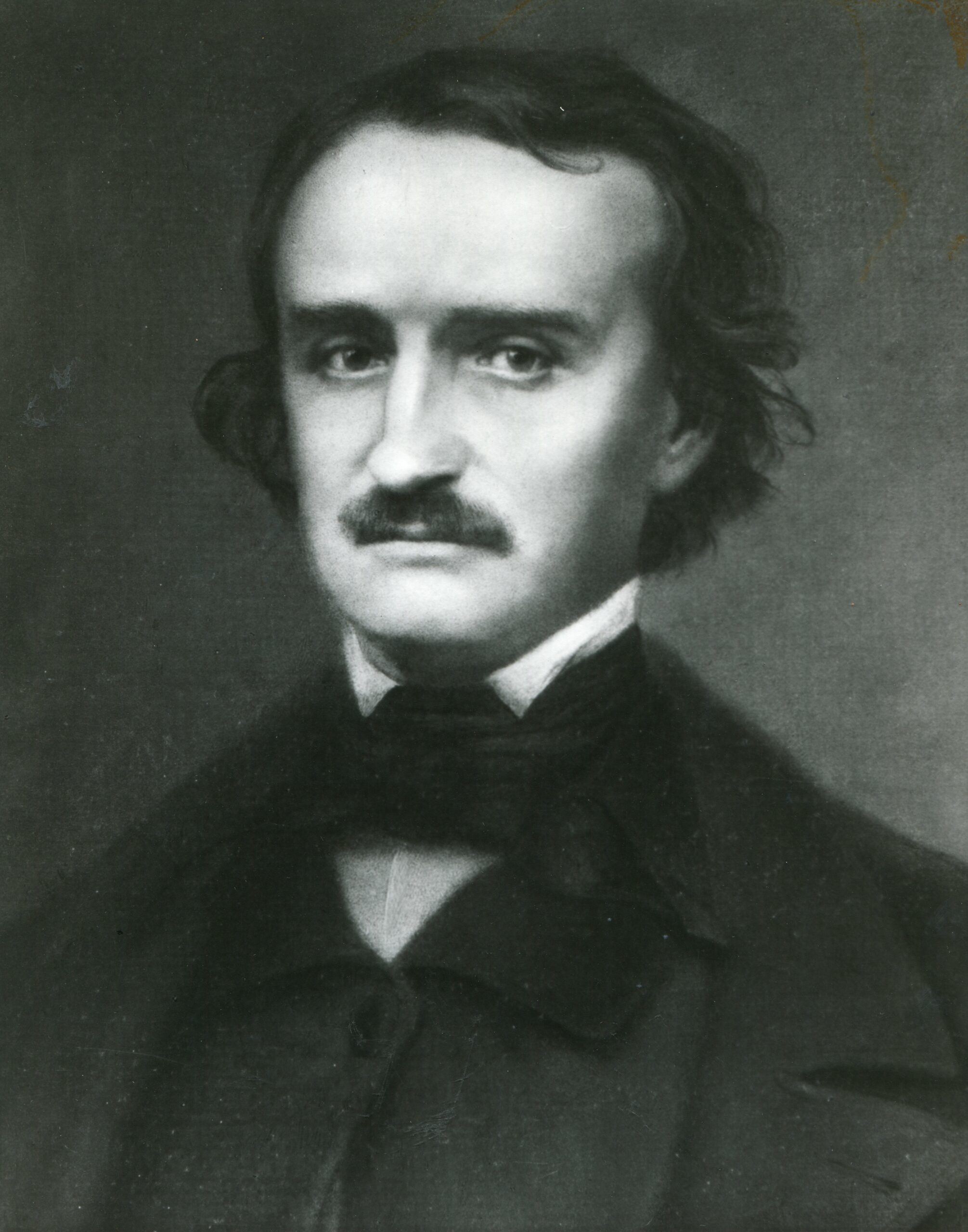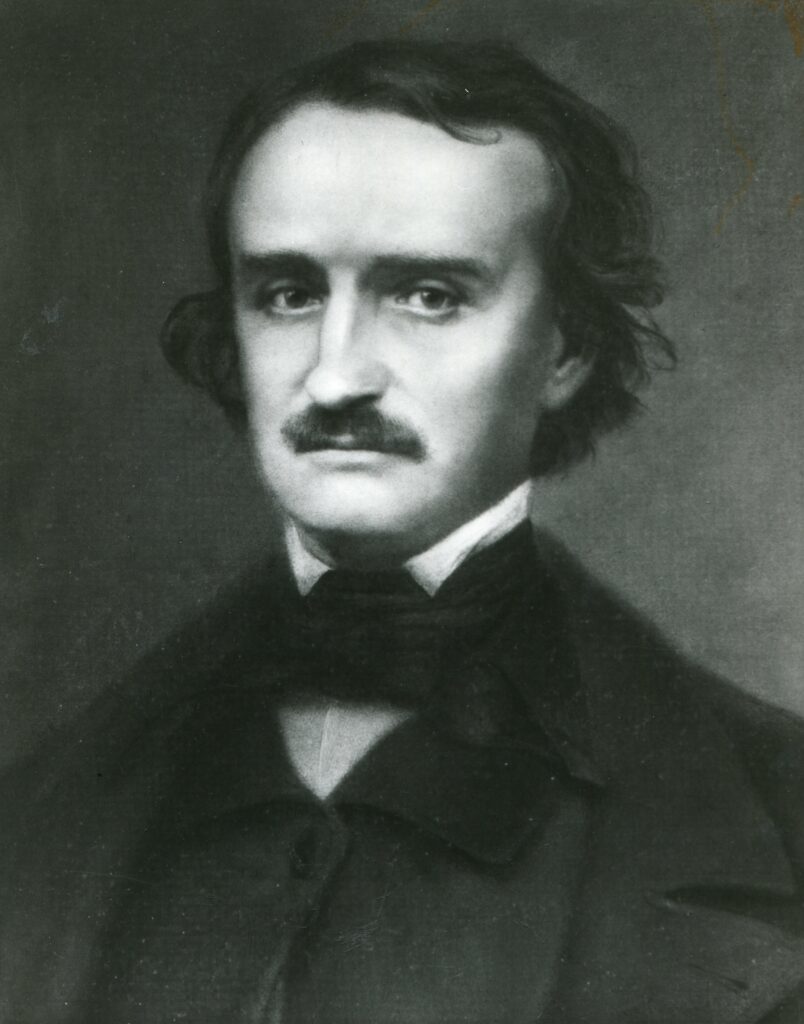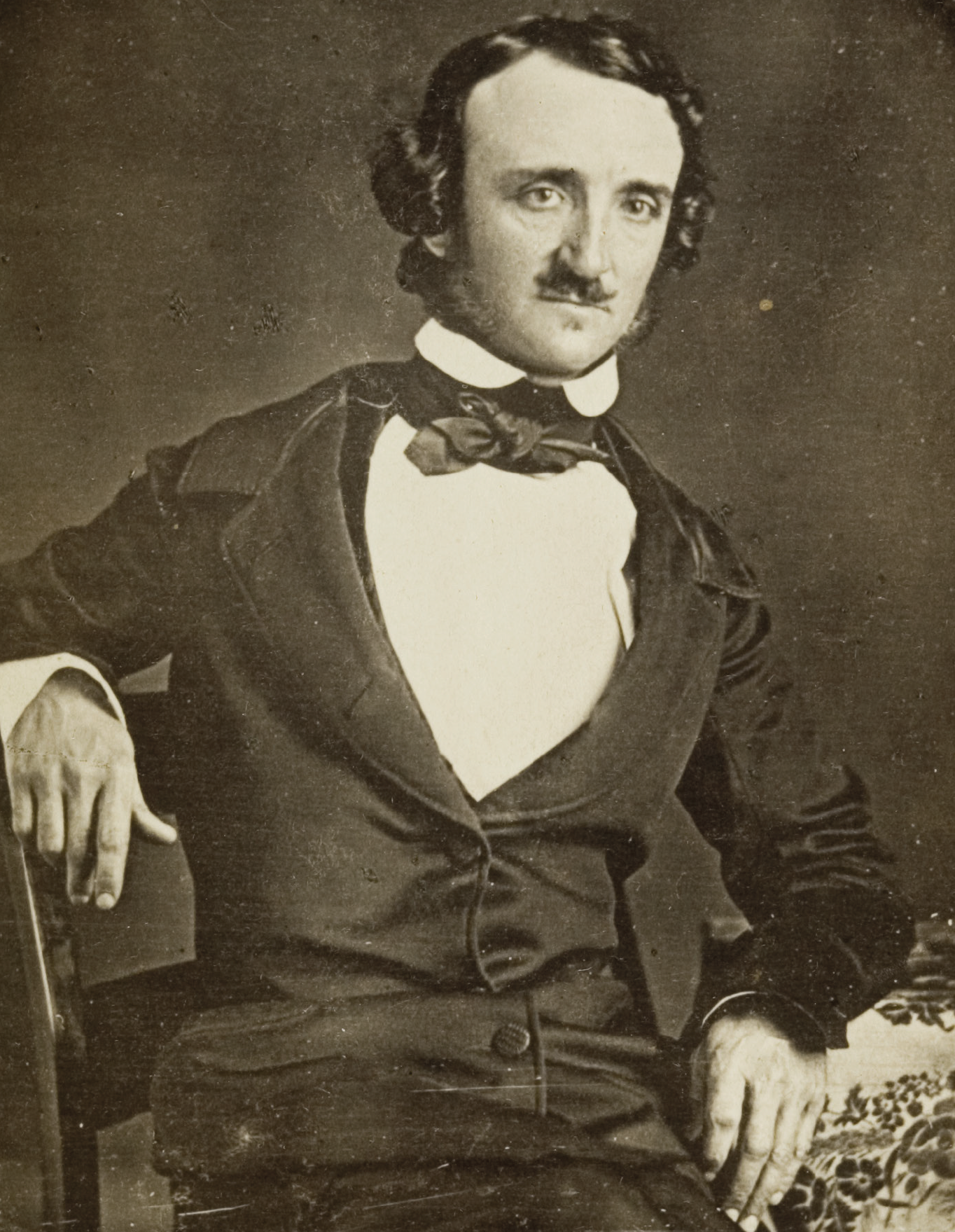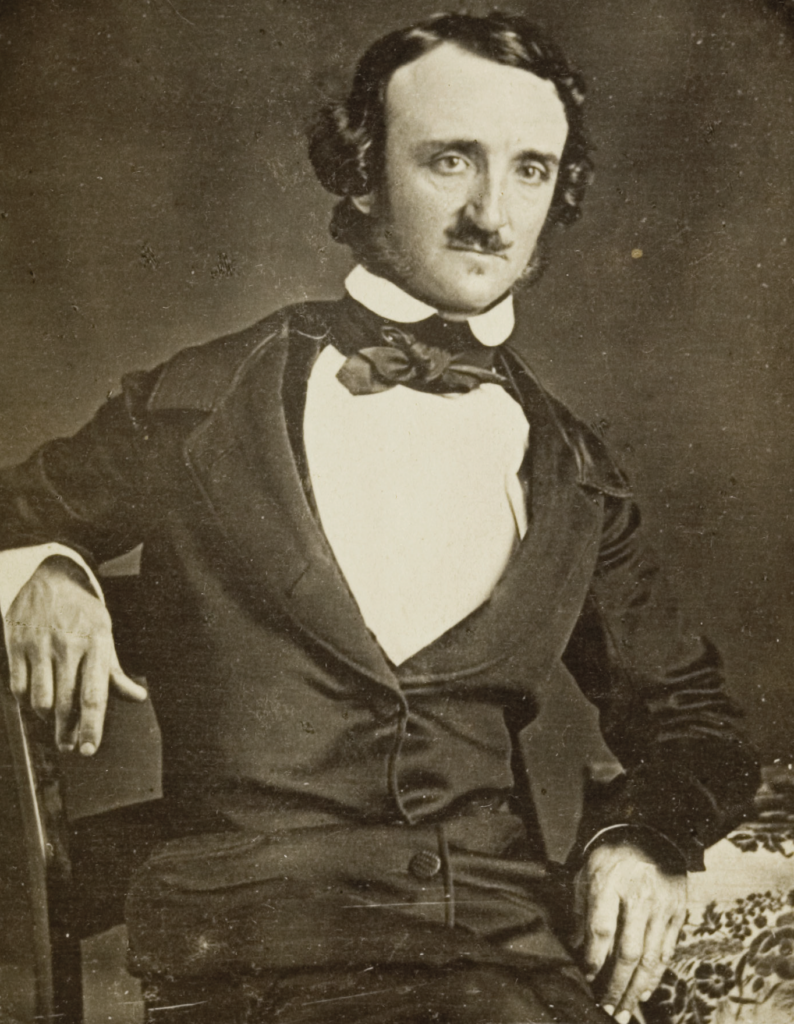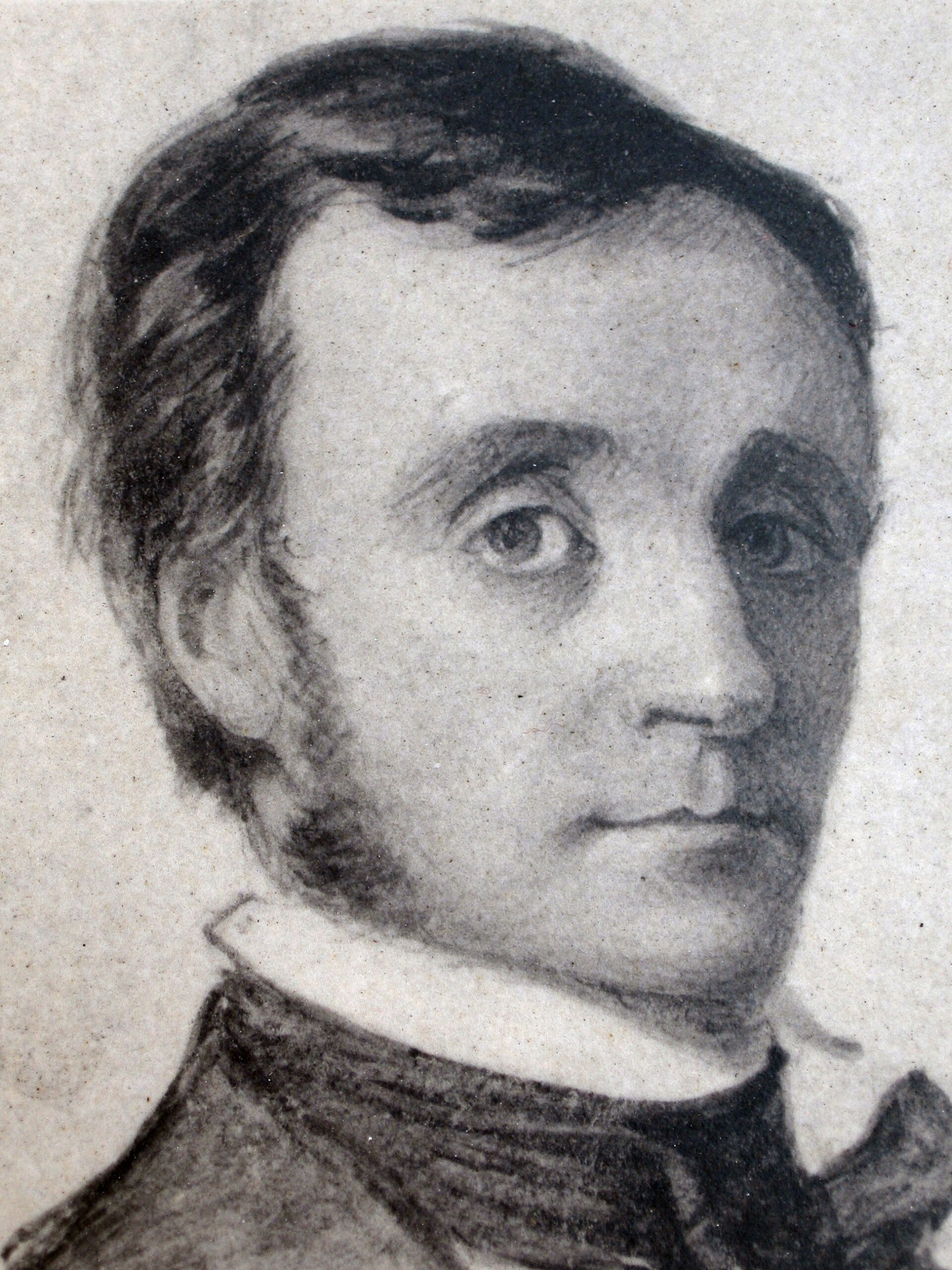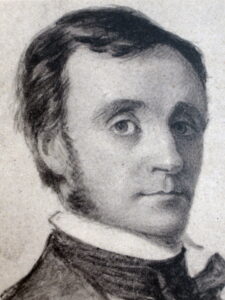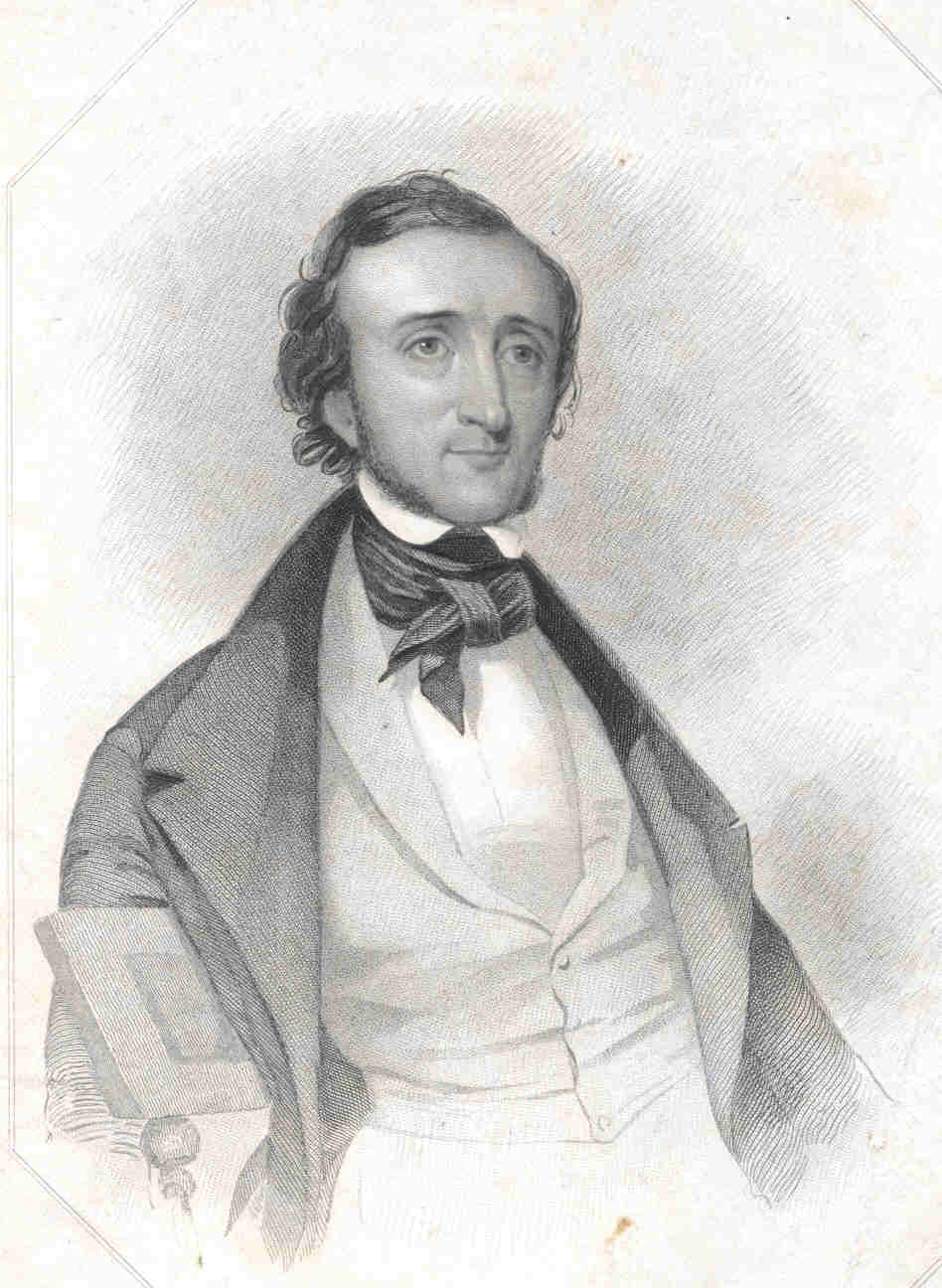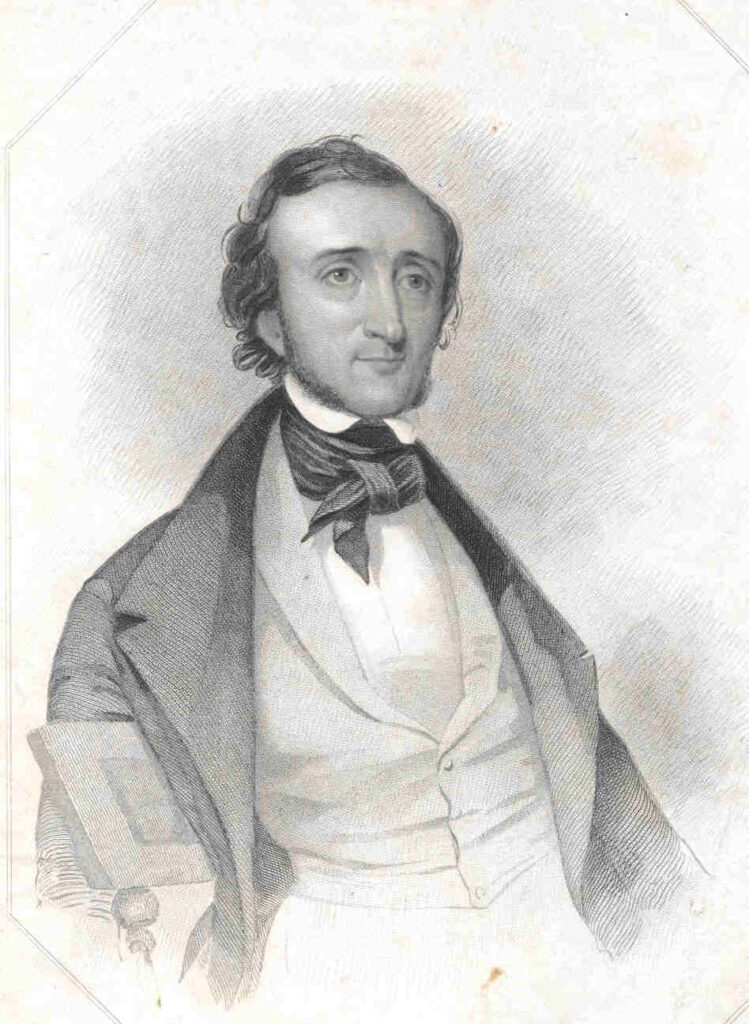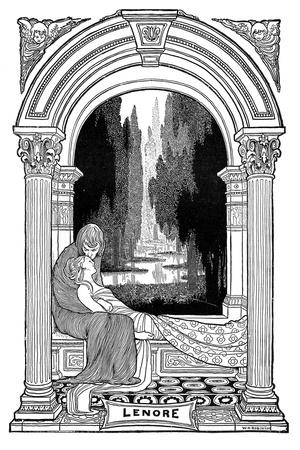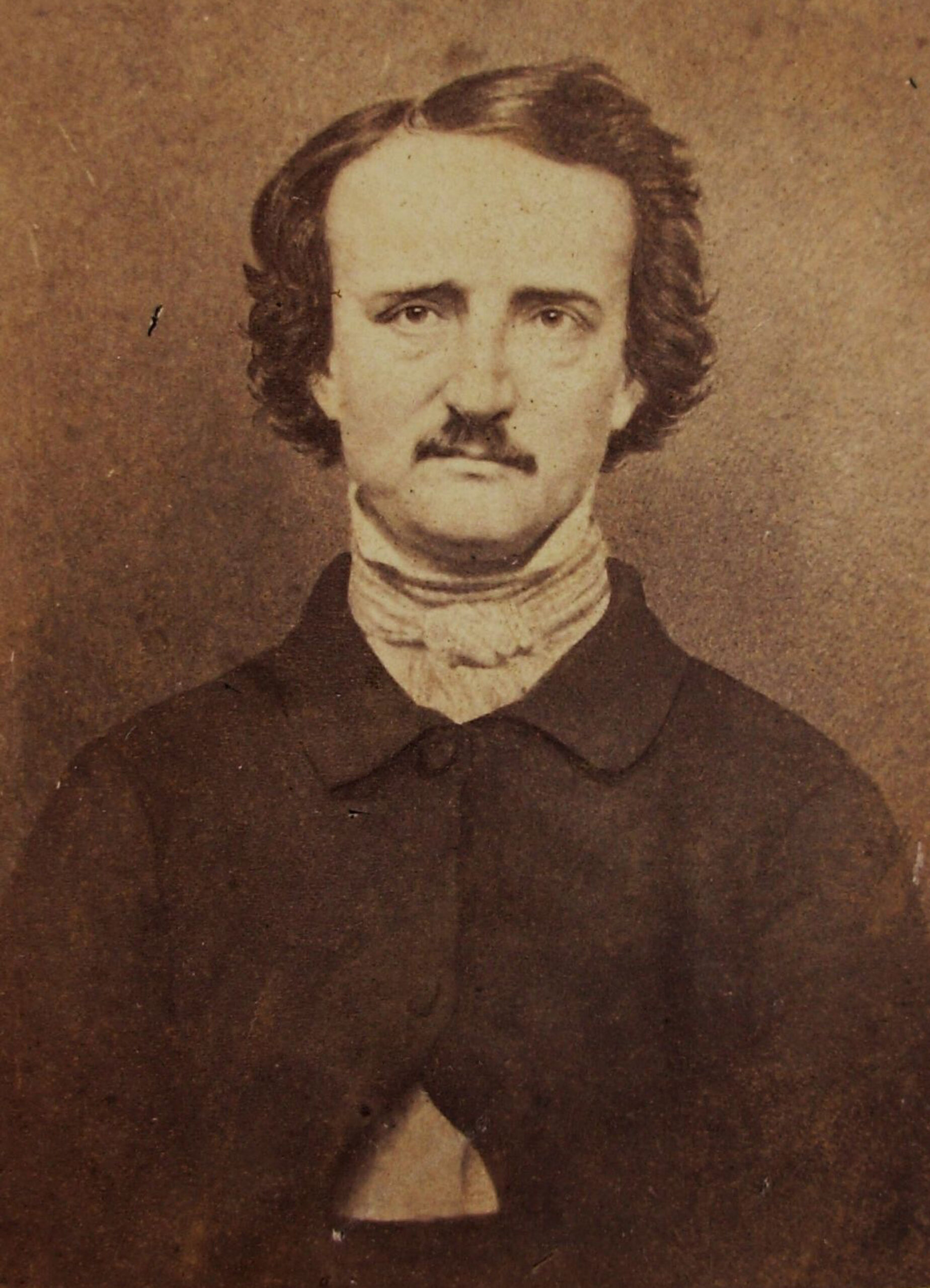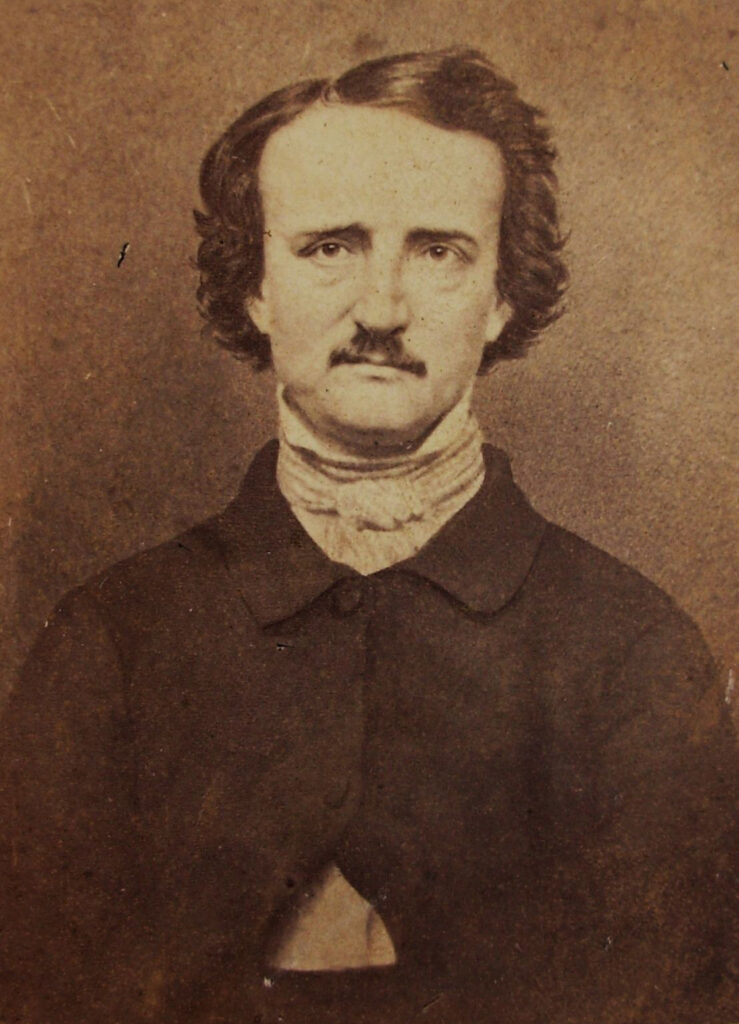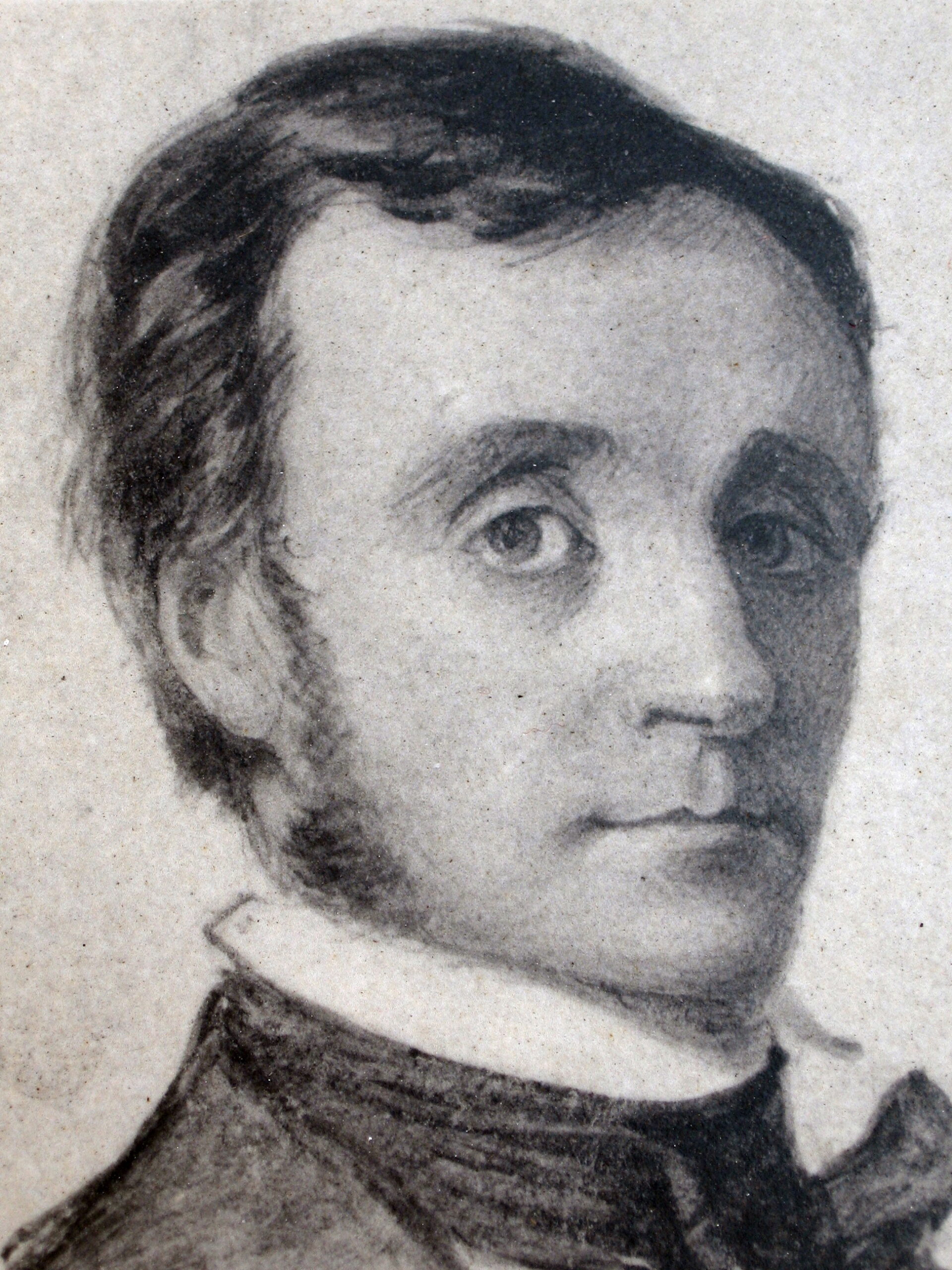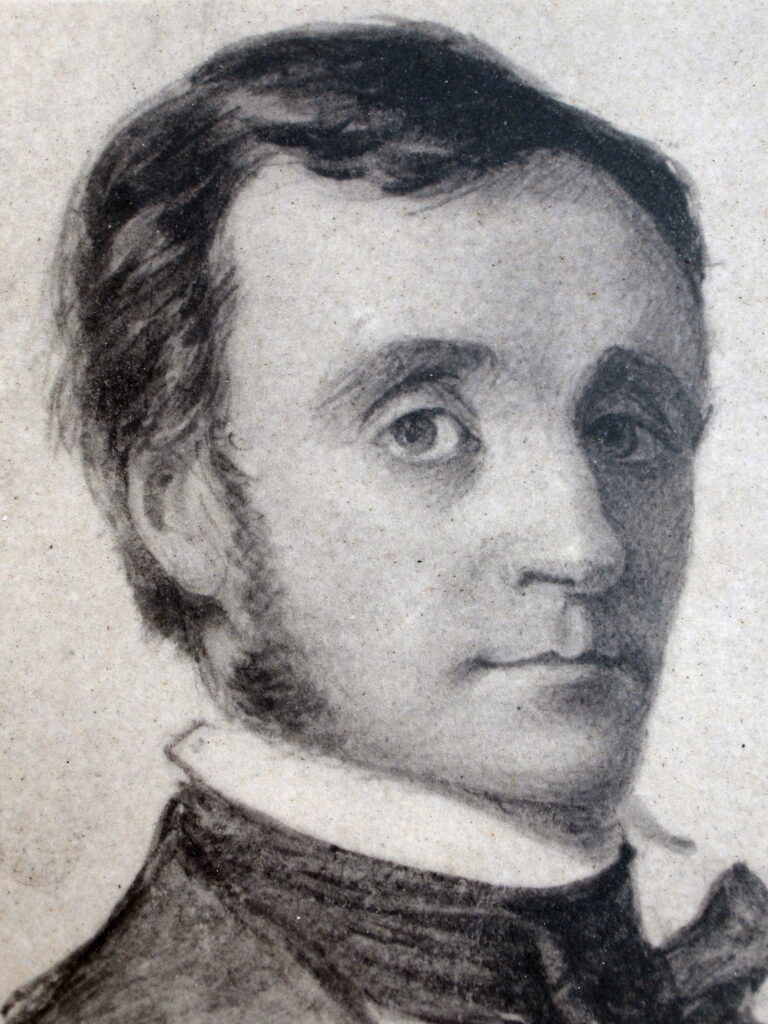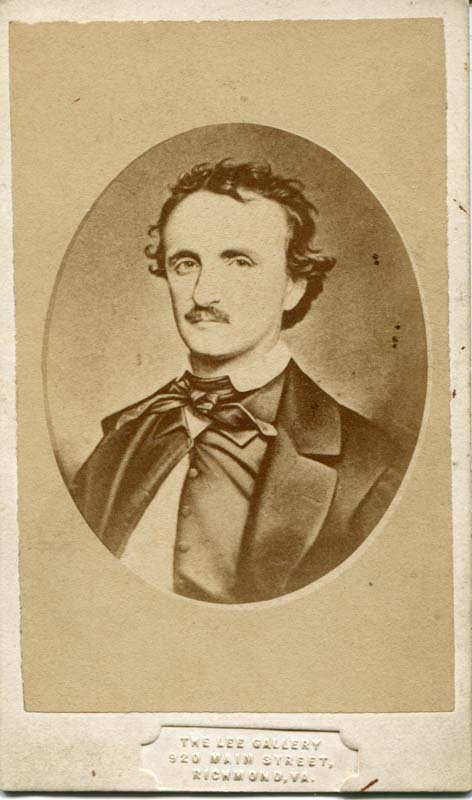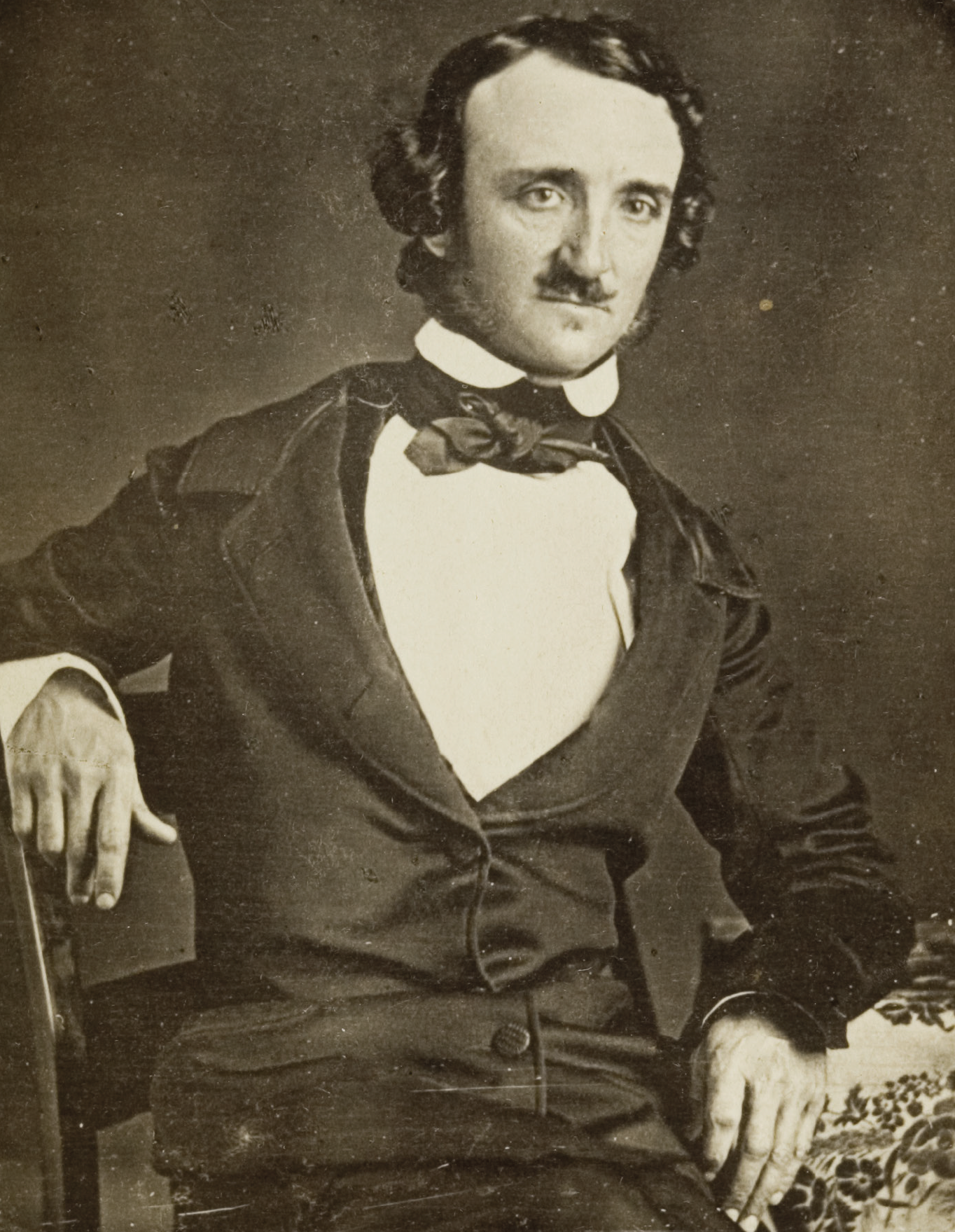Politian, A Tragedy.
Scene: Rome in the 16th century.
Characters:
- Lalage – an orphan ward of Di Broglio.
- Alessandra – niece of Di Broglio, and betrothed to Castiglione.
- Jacinta – servant maid to Lalage.
- Duke Di Broglio.
- Castiglione – his son and heir.
- San Ozzo – companion of Castiglione.
- Politian.
- Baldazzar – his friend.
- A monk.
- Ugo, Benito, and Rupert – Servants in the family of Di Broglio.
I.
An apartment in the Palazzo of Di Broglio. Traces of a protracted revel. On a wine-table some candles burnt to the socket. Masks, a lute, a lady’s slipper, cards and broken bottles are strewn about the floor and on the table. Enter Benito meeting Ugo intoxicated.
Ugo: Oh! is that you Benito (hiccup) are they gone?
Benito: Faith that’s a question, Ugo, hard to answer,
But are the bottles empty? — then they’re gone.
As for the Count San Ozzo who knocked me down
Just now on the staircase as I came up hither,
I can with more precision speak of him —
He’s gone, I’m sure of that — pretty far gone.
Ugo: Is the bravo gone? (hiccup) where is the buffo-singer?
Did you say his Excellency had departed?
Are all the fiddlers off (hiccup) the devil go with them!
I’m positively stupid for want of sleep!
Benito: (eyeing him.) Oh you are right — quite right — being as you say Ugo, a most confounded stupid man.
Ugo: Sirrah! I said not so, or else I (hiccup) lied.
Benito: I have no doubt, good Ugo, that you lied
Being, as you observe, a most notorious liar —
(Ugo sits, and helps himself to wine. Enter Rupert.)
Well, master Rupert what have you done with the count?
Rupert: What should I do with any drunken man?
I pulled him from under the table where he lay
And tumbled him into bed.
Benito: I say, good Rupert!
Can it be the Duke di Broglio is acquainted
With these untimely revels of his son?
It is a pity in so proper a man
Is’t not a pity in so young a man
And of so gentle blood? Here is a change
I had not look’d to see — he is sadly altered!
Ugo: He is drunk, Benito, — did you not say so, Rupert?
Most men are sadly altered when they’re drunk
Oh, I am sadly altered when I’m (hiccup) drunk.
Rupert: (to Benito.) You think the Count Castiglione altered —
I think so too. He was, not long ago,
Barring some trivial improprieties,
A very nobleman in heart and deed.
Benito: Now I’ve no faith in him, poor Lady Lalage!
So beautiful and kind.
Rupert: Truly Benito
His conduct there has damned him in my eyes.
O villain! villain! she his plighted wife
And his own father’s ward. I have noticed well
That we may date his ruin — so I call it —
His low debaucheries — his gambling habits
And all his numerous vices from the time
Of that most base seduction and abandonment.
Benito: We may: the sin sits heavy on his soul
And goads him to these courses. They say the Duke
Pardons his son, but is most wroth with her
And treats her with such marked severity
As humbles her to the dust.
Rupert: She sits alone
Continually in her chamber with clasped hands
(Jacinta tells me this).
Benito: Ah Noble lady!
I saw her yester eve thro’ the lattice-work
Of her chamber-window sobbing upon her knees
And ever and anon amid her sobs
She murmured forth Castiglione’s name
Rupert, she loves him still!
Rupert: How will she bear
Think you, the consummation of these nuptials?
Tomorrow week are they not?
Benito: Most true! they are.
Tomorrow week Castiglione weds
His cousin Alessandra. She was the friend
The bosom friend of the fair lady Lalage
Ere this mischance. I cannot bear to think
On the despair of the young lady Lalage.
Ugo: This wine’s not bad! gentlemen why d’ye blame
My master in this matter? very good (hiccup) wine!
Who is my lady Lalage? God knows!
I don’t, a super(hiccup)ciliary somebody
Who play’d on the guitar! most excellent wine!
And pride should have a fall. The count’s a rake
Or was, that very sure, but he’s reforming
And drinks none but the very (hiccup!) best of wine.
Rupert: Let us to bed! the man is steeped in liquor.
(to Benito.) Come let us to bed (Exeunt Rupertand Benito.)
Ugo: (arousing.) What did they say? to bed!
Is it so late? is it all gone? very well!
I will to bed anon (Enter Jacinta) ah! bless my eyes!
Jacinta! is it you?
Jacinta: Why, yes it is And yet it isn’t, Ugo, there’s a riddlel
I was Jacinta yesternight, but now Madam Jacinta if you please, Sir Ugo!
Ugo: Sweetheart, I fear me (hiccup!) very much (hiccup!) that you
Have been at the bottle — a pretty madam truly!
Jacinta: You may well say that Sir Ugo — very pretty!
At all events the Count Castiglione
Tells me I’m pretty — drunken dolt look here! (Showing some jewels)
Ugo: (Hiccup!) where?
Jacinta: Here! — look here!
Ugo: Jacinta! (hiccup!) why, Jacinta!
You do not mean to say the count my master
Gave you those jewels!
Jacinta: What if he did friend Ugo? What if he did?
Ugo: Look here! — I’ll take my oath
I saw that very ring upon the finger
The middle — the fore — no on the little finger
Of the Count. I’m (hiccup!) done with You Jacinta!
O you vile wretch! I’ll (hiccup!) not have you Jacinta!
I’m in despair! I’ll (hiccup!) do some desperate deed!
I’m desperate!
Jacinta: You’re drunk!
Ugo: I’m going to cut —
Jacinta: Your throat! O Heaven!
Ugo: To cut you altogether! I’m gone Jacinta. (going.)
Jacinta: (pulling him back.) Stop! you snivelling fool!
Will you not see the jewels — look you here!
This broach — these pearls — these rubies — don’t you see?
Ugo: (sulkily.) I see.
Jacinta: These emeralds and this topaz! — won’t you see?
Ugo: I see.
Jacinta: You see! you see! can I get nothing more
Out of your ugly mouth but “I see, I see”? —
Dolt I’m not sure you see — or if you see
You certainly see double. Here’s a cross
A cross of rubies, you oaf! a cross of rubies!
D’ye hear — a cross which never cost a zecchin
Less than five thousand crowns!
Ugo: I see, oh I (hiccup!) see it all. (looking knowing.)
Jacinta: You see it all!
You do not see it all. Heaven grant me patience!
You do not see it all (mocking him) you do not see
That I’m the richest waiting maid in Rome
The richest vintner’s daughter owning these jewels!
You do not see, I say, that my mistress Lalage
Who gave them to me, d’ye hear? who gave them to me
As a free gift, and for a marriage present
(All of her jewels! — every one of them!)
Is certainly gone mad!
Ugo: The lady Lalage
Gave you the jewels! How (hiccup!) came you by the ring?
Jacinta: The count Castiglione, your sweet master
Gave it her as a token of his love
Last year — she gave it to me — d’ye see?
Ugo: Jacinta! (with a leer.)
Jacinta: Ugo! (returning it.)
Ugo: What dear Jacinta?
Jacinta: Do you see?
Ugo: Oh, nonsense, sweet Jacinta, let me look
Again (hiccup!) at the jewesl
Jacinta: D’ye see?
Ugo: Pshaw! — let me look!
Jacinta: D’ye see? (going and holding up the jewels.)
Ugo: Sweet, dear, Jacinta! madame Jacinta.
Jacinta: Oh I see. (Puts them up and exit followed by Ugo staggering.)
II.
Castiglione’s dressing-room. Castiglione(in dishabille) and San Ozzo.
San Ozzo: An excellent joke!
I’ faith an excellent joke!
Ha! ha! hat ha! — a most superlative joke!
I shall die, Castiglione, I shall die!
Ha! ha! ha! ha! — Oh, I shall die of laughing!
I shall die, I shall die.
Castiglione: (sullenly.) I meant it for no joke.
San Ozzo: Oh no! oh no! — you meant it for no joke.
Not you! — ha! ha! ha! ha! — I’ll die, I’ll die!
It’s a very serious business I assure you
To get drunk — a very serious business — excellent!
So you’ve turned penitent at last — bravo!
Why, Cast I’ve got a string of beads at home
(I’ll send them to you) — a bundle of paternosters
(You shall have them all) a robe of sackcloth too
I used at a masquerade, you shall have it — you shall have it!
And I’ll go home and send you in a trice A tub of excellent ashes!
Castiglione: San Ozzo! have done for — (hesitating.)
San Ozzo: Oh! I am — I am done for — completely done for — I’ll die!
I shall die of laughing — yes! I’m done for — I’m done fort
Castiglione: (sternly.) San Ozzo!
San Ozzo: Sir?
Castiglione: I am serious.
San Ozzo: I know it — very!
Castiglione: Why then do you worry me with these ribald jests
I’ve the headache, and besides I am not well
Either in body or soul. When saw you last
The lady — Lalage?
San Ozzo: Not for eleven months. What could have put that creature in your head?
Castiglione: (fiercely.) San Ozzo!
San Ozzo: (calmly.) Sir?
Castiglione: (after a pause.) Nothing. When did you say
You spoke to the Lady Lalage?
San Ozzo: Sir Count, I have not seen her for eleven months.
The Duke your father, as you very well know,
Keeps her secluded from society
And, between you and I, he’s right in it:
Ha! ha! you understand?
Castiglione: Not I, San Ozzo!
I do not understand.
San Ozzo: Well! well! no matter (sings.)
Birds of so fine a feather
And of so wanton eye
Should be caged — should be caged
Should be caged in all weather
Lest they fly!
Castiglione: San Ozzo! you do her wrong — unmanly wrong
Never in woman’s breast enthroned sat
A purer heart! If ever woman fell
With an excuse for falling it was she!
If ever plighted vows most sacredly
Solemnly sworn perfidiously broken
Will damn a man, that damned villain am I!
Young, ardent, beautiful, and loving well
And pure as beautiful, how could she think —
How could she dream, being herself all truth
Of my black perfidy? Oh that I were not
Castiglione but some peasant hind
The humble tiller of some humble field
That I might dare be honest!
San Ozzo: Exceeding fine!
I never heard a better speech in my life.
Besides you’re right — Oh! honesty’s the thing!
Honesty, poverty, and true content,
With the unutterable extacies
Of butternuts, gingerbread, and milk and water!
Castiglione: (trying to suppress a smile.) San Ozzo you are a fool!
San Ozzo: He’s right again. My lord, I’m going home,
Ere I be tainted with your wisdomship.
Good day! — I crave your patronage however
When you become a cardinal: meantime
I’ll take the opportunity of sending
The sackcloth and the ashes. (Exit.)
Castiglione: Get you gone
You merry devil! ha! ha! he makes me laugh
Spite of myself. One can’t be angry with him
For the life of one. After all I don’t see why
I should so grieve about this little matter
This every-day occurrence. Marry her — no!
Castiglione wed him with a wanton!
Never! — oh never! — what would they say at the club?
What would San Ozzo think? I have no right
Had I the will, to bring such foul disgrace
Upon my family — Di Broglio’s line
Di Broglio’s haughty and time-honoured line!
No right at all to do it. Am I not bound too
By the most sacred ties of honor bound
To my cousin Alessandra? Honor’s the thing!
I can not pawn my honor! and Lalage
Is lowly born — I can not pawn my honor.
My honor — my honor. Pshaw! Pshaw! ‘tis but the headache –
The consequence of yestereve’s debauch —
Gives me these qualms of conscience. Be a man!
A man, Castiglione, be a man!
A glass of wine will put you all to rights. Ugo! — do you hear there? — wine!
(Enter Ugo, bearing a bundle and a basket full of bottles.)
What the devil’s that?
Ugo: (hesitatingly.) My lord!
Castiglione: What’s that I say? — where is the wine?
Ugo: My lord! — the wine? — here is some wine my lord —
A dozen bottles, my lord.
Castiglione: A dozen fools!
Bring me a glass of wine!
Ugo: A dozen bottles
So please you, Sir, of best Salermo brand
Sent as a present by his reverence
The Count San Ozzo.
Castiglione: Really I’m much obliged
(smiling) To his reverence — did you not say his reverence?
Uncork a bottle, Ugo, and let me see
What it is made of.
Ugo: No, Sir, you can’t have any.
Castiglione: How, Sir! — not have it? — what do you mean by that?
Ugo: Not a drop, Sir, — not a drop.
Castiglione: And why? you ass.
Ugo: Why, Sir, you see, the servant who brings it says
You’re not to have the wine, only your choice.
Castiglione: What does the idiot mean?
Ugo: There’s another present Down in the hall, Sir, — you’re to have your choice
Of the wine or of that.
Castiglione: Blockhead! why don’t you bring
The other present in?
Ugo: Eh? — Sir?
Castiglione: Dolt! dunderhead! why don’t you bring me up
The other present and let me see it?
Ugo: I can’t.
Castiglione: You can’t! you villain? I’ll try and make you then!
(in a passion) Scoundrel bring it up! What’s that you have on your shoulder?
Ugo: Sir? — it’s the sackcloth, and that down below
(throwing down the bundle) ‘S a monstrous tub of ashes — I can’t lift it.
Castiglione: A monstrous tub of ashes! San Ozzo’s a fool!
Ha! hat ha! ha! too bad upon my soul!
A tub of ashes! too bad! I can’t be angry
If I should die for it — to have my choice
The wine or the ashes! Ugo, send word to the Count
Ha! ha! ha! ha! — Ugo send word to the Count
I’ll keep the wine, and he may have the ashes.
Stay! — tell him I’ve been thinking — I’ve been thinking
Of what he said — he knows — and that I’ll meet him
At the masquerade, and afterwards crack a bottle
(Exit Ugo)
With him and the buffo-singer. Ha! ha! ha!
Only to think of that! a tub of ashes!
Ha! ha! ha! ha! I can’t be angry with him!
He’s a fine fellow after all, San Ozzo! (Exit.)
III.
ROME. — A Hall in a Palace. Alessandraand Castiglione.
Alessandra: Thou art sad, Castiglione.
Castiglione: Sad! — not I.
Oh, I’m the happiest, happiest man in Rome!
A few days more, thou knowest, my Alessandra,
Will make thee mine. Oh, I am very happy!
Alessandra: Methinks thou hast a singular way of showing
Thy happiness! — what ails thee, cousin of mine?
Why didst thou sigh so deeply?
Castiglione: Did I sigh?
I was not conscious of it. It is a fashion,
A silly — a most silly fashion I have
When I am very happy. Did I sigh? (sighing.)
Alessandra: Thou didst. Thou art not well. Thou hast indulged
Too much of late, and I am vexed to see it.
Late hours and wine, Castiglione, — these
Will ruin thee! thou art already altered —
Thy looks are haggard — nothing so wears away
The constitution as late hours and wine.
Castiglione: (musing.) Nothing, fair cousin, nothing — not even deep sorrow —
Wears it away like evil hours and wine.
I will amend.
Alessandra: Do it! I would have thee drop
Thy riotous company, too — fellows low born —
Ill suit the like with old Di Broglio’s heir
And Alessandra’s husband.
Castiglione: I will drop them.
Alessandra: Thou wilt — thou must. Attend thou also more
To thy dress and equipage — they are over plain
For thy lofty rank and fashion — much depends
Upon appearances.
Castiglione: I’ll see to it.
Alessandra: Then see to it! — pay more attention, sir,
To a becoming carriage — much thou wantest
In dignity.
Castiglione: Much, much, oh much I want
In proper dignity.
Alessandra: (haughtily.) Thou mockest me, sir!
Castiglione: (abstractedly.) Sweet, gentle Lalage!
Alessandra: Heard I aright?
I speak to him — he speaks of Lalage!
Sir Count! (places her hand on his shoulder) what art thou dreaming? he’s not well!
What ails thee, sir?
Castiglione: (startling.) Cousin! fair cousin! — madam!
I crave thy pardon — indeed I am not well —
Your hand from off my shoulder, if you please.
This air is most oppressive! — Madam — the Duke!
(Enter Di Broglio.)
Di Broglio: My son, I’ve news for thee! — hey? — what’s the matter? (observing Alessandra.)
I’ the pouts? Kiss her, Castiglione! kiss her,
You dog! and make it up, I say, this minute!
I’ve news for you both. Politian is expected
Hourly in Rome — Politian, Earl of Leicester!
We’ll have him at the wedding. ’Tis his first visit
To the imperial city.
Alessandra: What! Politian
Of Britain, Earl of Leicester?
Di Broglio: The same, my love.
We’ll have him at the wedding. A man quite young
In years, but grey in fame. I have not seen him,
But Rumour speaks of him as of a prodigy
Pre-eminent in arts and arms, and wealth,
And high descent. We’ll have him at the wedding.
Alessandra: I have heard much of this Politian.
Gay, volatile and giddy — is he not?
And little given to thinking.
Di Broglio: Far from it, love.
No branch, they say, of all philosophy
So deep abstruse he has not mastered it.
Learned as few are learned.
Alessandra: ’Tis very strange!
I have known men have seen Politian
And sought his company. They speak of him
As of one who entered madly into life,
Drinking the cup of pleasure to the dregs.
Castiglione: Ridiculous! Now I have seen Politian
And know him well — nor learned nor mirthful he.
He is a dreamer and a man shut out
From common passions.
Di Broglio: Children, we disagree.
Let us go forth and taste the fragrant air
Of the garden. Did I dream, or did I hear
Politian was a melancholy man? (exeunt.)
IV.
A Lady’s apartment, with a window open and looking into a garden. Lalage, in deep mourning, reading at a table on which lie some books and a hand mirror. In the background Jacinta (a servant maid) leans carelessly upon a chair.
Lalage: Jacinta! is it thou?
Jacinta: (pertly.) Yes, Ma’am, I’m here.
Lalage: I did not know, Jacinta, you were in waiting.
Sit down! — Let not my presence trouble you —
Sit down! — for I am humble, most humble.
Jacinta: (aside.) ’Tis time.
(Jacinta seats herself in a side-long manner upon the chair, resting her elbows upon the back, and regarding her mistress with a contemptuous look. Lalage continues to read.)
Lalage: “It in another climate, so he said,
“Bore a bright golden flower, but not i’ [[in]] this soil!”
(pauses — turns over some leaves, and resumes.)
“No lingering winters there, nor snow, nor shower —
“But Ocean ever to refresh mankind
“Breathes the shrill spirit of the western wind.”
Oh, beautiful! — most beautiful! — how like
To what my fevered soul doth dream of Heaven!
O happy land! (pauses.) She died! — the maiden died!
O still more happy maiden who couldst die!
Jacinta!
(Jacinta returns no answer, and Lalage presently resumes.)
Again! — a similar tale
Told of a beauteous dame beyond the sea!
Thus speaketh one Ferdinand in the words of the play —
“She died full young” — one Bossola answers him —
“I think not so — her infelicity
“Seemed to have years too many” — Ah luckless lady!
Jacinta! (still no answer.)
Here’s a far sterner story
But like — oh, very like in its despair —
Of that Egyptian queen, winning so easily
A thousand hearts — losing at length her own.
She died. Thus endeth the history — and her maids
Lean over and weep — two gentle maids
With gentle names — Eiros and Charmion!
Rainbow and Dove! —— Jacinta!
Jacinta: (pettishly.) Madam, what is it?
Lalage: Wilt thou, my good Jacinta, be so kind
As go down in the library and bring me
The Holy Evangelists.
Jacinta: Pshaw! (exit.)
Lalage: If there be balm
For the wounded spirit in Gilead it is there!
Dew in the night time of my bitter trouble
Will there be found — “dew sweeter far than that
Which hangs like chains of pearl on Hermon hill.”
(re-enter Jacinta, and throws a volume on the table.)
There, ma’am,’s the book. Indeed she is very troublesome. (aside.)
Lalage: (astonished.) What didst thou say, Jacinta? Have I done aught
To grieve thee or to vex thee? — I am sorry.
For thou hast served me long and ever been
Trust-worthy and respectful.
(resumes her reading.)
Jacinta: I can’t believe
She has any more jewels — no — no — she gave me all. (aside.)
Lalage: What didst thou say, Jacinta? Now I bethink me
Thou hast not spoken lately of thy wedding.
How fares good Ugo? — and when is it to be?
Can I do aught? — is there no farther aid
Thou needest, Jacinta?
Jacinta: Is there no farther aid!
That’s meant for me. (aside) I’m sure, madam, you need not
Be always throwing those jewels in my teeth.
Lalage: Jewels! Jacinta, — now indeed, Jacinta,
I thought not of the jewels.
Jacinta: Oh! perhaps not!
But then I might have sworn it. After all,
There’s Ugo says the ring is only paste,
For he’s sure the Count Castiglione never
Would have given a real diamond to such as you;
And at the best I’m certain, Madam, you cannot
Have use for jewels now. But I might have sworn it. (exit.)
(Lalage bursts into tears and leans her head upon the table — after a short pause raises it.)
Lalage: Poor Lalage! — and is it come to this?
Thy servant maid! — but courage! — ‘tis but a viper
Whom thou hast cherished to sting thee to the soul!
(taking up the mirror)
Ha! here at least’s a friend — too much a friend
In earlier days — a friend will not deceive thee.
Fair mirror and true! now tell me (for thou canst)
A tale — a pretty tale — and heed thou not
Though it be rife with woe: It answers me.
It speaks of sunken eyes, and wasted cheeks,
And Beauty long deceased — remembers me
Of Joy departed — Hope, the Seraph Hope,
Inurned and entombed! — now, in a tone
Low, sad, and solemn, but most audible,
Whispers of early grave untimely yawning
For ruined maid. Fair mirror and true! — thou liest not!
Thou hast no end to gain — no heart to break —
Castiglione lied who said he loved ——
Thou true — he false! — false! — false!
(While she speaks, a monk enters her apartment, and approaches unobserved.)
Monk: Refuge thou hast,
Sweet daughter! in Heaven. Think of eternal things!
Give up thy soul to penitence, and pray!
Lalage: (arising hurriedly.) I cannot pray! — My soul is at war with God!
The frightful sounds of merriment below
Disturb my senses — go! I cannot pray —
The sweet airs from the garden worry me!
Thy presence grieves me — go! — thy priestly raiment
Fills me with dread — thy ebony crucifix
With horror and awe!
Monk: Think of thy precious soul!
Lalage: Think of my early days! — think of my father
And mother in Heaven! think of our quiet home,
And the rivulet that ran before the door!
Think of my little sisters! — think of them!
And think of me! — think of my trusting love
And confidence — his vows — my ruin — think — think
Of my unspeakable misery! —— begone!
Yet stay! yet stay! — what was it thou saidst of prayer
And penitence? Didst thou not speak of faith
And vows before the throne?
Monk: I did.
Lalage: ’Tis well.
There is a vow were fitting should be made —
A sacred vow, imperative, and urgent,
A solemn vow!
Monk: Daughter, this zeal is well!
Lalage: Father, this zeal is anything but well!
Hast thou a crucifix fit for this thing?
A crucifix whereon to register
This sacred vow? (he hands her his own.)
Not that — Oh! no! — no! — no! (shuddering.)
Not that! Not that! — I tell thee, holy man,
Thy raiments and thy ebony cross affright me!
Stand back! I have a crucifix myself, —
I have a crucifix! Methinks ‘twere fitting
The deed — the vow — the symbol of the deed —
And the deed’s register should tally, father!
(draws a cross-handled dagger and raises it on high.)
Behold the cross wherewith a vow like mine
Is written in Heaven!
Monk: Thy words are madness, daughter,
And speak a purpose unholy — thy lips are livid —
Thine eyes are wild — tempt not the wrath divine!
Pause ere too late! — oh be not — be not rash!
Swear not the oath — oh swear it not!
Lalage: ’Tis sworn!
V.
A room in the palace of Di Broglio: Di Broglio and Castiglione:
Castiglione: [[. . . about twenty or thirty lines are lost from the manuscript . . .]] Undoubtedly.
Duke: Why do you laugh?
Castiglione: Indeed
I hardly know myself. Stay! was it not
On yesterday we were speaking of the Earl?”
Of the Earl Politian? Yes it was yesterday.
Alessandra, you and I, you must remember!
We were walking in the garden.
Duke: Perfectly
I do remember it — what of it? — what then?
Castiglione: O nothing — nothing at all.
Duke: Nothing at all!
It is most singular now that you should laugh
At nothing at all!
Castiglione: Most singular — singular!
Duke: Look you, Castiglione, be so kind
As tell me, Sir, at once what is’t you mean. What are you talking of?
Castiglione: Was it not so?
We differed in opinion touching him.
Duke: Him! — whom?
Castiglione: Why, Sir, the Earl Politian.
Duke: The Earl of Leicester! — yes! — is it he you mean?
We differed indeed. If I now recollect
The words you used were that the Earl you knew
Was neither learned nor mirthful.
Castiglione: Ha! ha! — now did I?
Duke: That did you, Sir, and well I knew at the time
You were wrong — it being not the character
Of the Earl — whom all the world allows to be
A most hilarious man. Be not, my son,
Too positive again.
Castiglione: ’Tis singular!
Most singular! I could not think it possible
So little time could so much alter one!
To say the truth about an hour ago
As I was walking with the Count San Ozzo
All arm in arm we met this very man
The Earl — he with his friend Baldazzar
Having just arrived in Rome. Ha! ha! he is altered!
Such an account he gave me of his journey!
‘Twould have made you die with laughter — such tales he told
Of his caprices and his merry freaks
Along the road — such oddity — such humour
Such wit — such whim — such flashes of wild merriment
Set off too in such full relief by the grave
Demeanour of his friend — who to speak the truth
Was gravity itself.
Duke: Did I not tell you?
Castiglione: You did — and yet ‘tis strange! but true as strange.
How much I was mistaken! I always thought The Earl a gloomy man.
Duke: So, So, you see.
Be not too positive. Whom have we here?
It cannot be the Earl?
Castiglione: The Earl! oh, no!
’Tis not the Earl — but yet it is — and leaning
Upon his friend Baldazzar. Ah! welcome, Sirl
(Enter Politian and Baldazzar.)
My Lord! a second welcome let me give you
To Rome — his Grace the Duke of Broglio.
Father! this is the Earl Politian, Earl
Of Leicester in Great Britain, (Politian bows haughtily) this his friend
Baldazzar, Duke of Surrey. The Earl has letters,
So please you for your Grace.
Duke: Ah — ha! most welcome
To Rome and to our palace Earl Politian!
And you most noble Duke! am glad to see you!
I knew your father well, my lord Politian.
Castiglione! call your cousin hither
And let me make the noble Earl acquainted
With your betrothed. You come, Sir, at a time
Most seasonable. The wedding —
Politian: Touching those letters, Sir,
Your son made mention of — (your son is he not?)
Touching those letters, Sir, I wot not of them.
If such there be, my friend Baldazzar here —
Baldazzar! — ah! — my friend Baldazzar here
Will hand them to your Grace. I would retire.
Duke: Retire! — so soon?
Castiglione: What ho! Benito! Rupert!
His lordship’s chambers — show his lordship to them!
His lordship is unwell! (Enter Benito.)
Benito: This way my lord! (Exit followed by Politian:)
Duke: Retire! — unwell!
Baldazzar: So please you, Sir, I fear me
’Tis as you say — his lordship is unwell.
The damp air of the evening — the fatigue
Of a long journey — the — indeed I had better
Follow his lordship. He must be unwell.
I will return anon.
Duke: Return anon!
Now this is very strange! Castiglione!
This way, my son, I wish to speak with thee.
You surely were mistaken in what you said
Of the Earl, mirthful indeed! — which of us said
Politian was a melancholy man? (Exeunt.)
VI.
An apartment in a palace. Politian and Baldazzar.
Baldazzar. ——— Arouse thee now, Politian!
Thou must not — nay indeed, indeed, thou shalt not
Give way unto these humours. Be thyself!
Shake off the idle fancies that beset thee,
And live, for now thou diest!
Politian. Not so, Baldazzar!
Surely I live.
Baldazzar. Politian, it doth grieve me
To see thee thus.
Politian. Baldazzar, it doth grieve me
To give thee cause for grief, my honoured friend.
Command me, sir! what wouldst thou have me do?
At thy behest I will shake off that nature
Which from my forefathers I did inherit,
Which with my mother’s milk I did imbibe,
And be no more Politian, but some other.
Command me, sir!
Baldazzar. To the field then — to the field —
To the senate or the field.
Politian. Alas! alas!
There is an imp would follow me even there!
There is an imp hath followed me even there!
There is —— what voice was that?
Baldazzar. I heard it not.
I heard not any voice except thine own,
And the echo of thine own.
Politian. Then I but dreamed.
Baldazzar. Give not thy soul to dreams: the camp — the court
Befit thee — Fame awaits thee — Glory calls —
And her the trumpet-tongued thou wilt not hear
In hearkening to imaginary sounds
And phantom voices.
Politian. It is a phantom voice!
Didst thou not hear it then?
Baldazzar. I heard it not.
Politian. Thou heardst it not! —— Baldazaar, speak no more
To me, Politian, of thy camps and courts.
Oh! I am sick, sick, sick, even unto death,
Of the hollow and high-sounding vanities
Of the populous Earth! Bear with me yet awhile!
We have been boys together — school-fellows —
And now are friends — yet shall not be so long —
For in the eternal city thou shalt do me
A kind and gentle office, and a Power —
A Power august, benignant and supreme —
Shall then absolve thee of all further duties
Unto thy friend.
Baldazzar. Thou speakest a fearful riddle
I will not understand.
Politian. Yet now as Fate
Approaches, and the Hours are breathing low,
The sands of Time are changed to golden grains,
And dazzle me, Baldazzar. Alas! alas!
I cannot die, having within my heart
So keen a relish for the beautiful
As hath been kindled within it. Methinks the air
Is balmier now than it was wont to be —
Rich melodies are floating in the winds —
A rarer loveliness bedecks the earth —
And with a holier lustre the quiet moon
Sitteth in Heaven. — Hist! hist! thou canst not say
Thou hearest not now, Baldazzar?
Baldazzar. Indeed I hear not.
Politian. Not hear it! — listen now — listen! — the faintest sound
And yet the sweetest that ear ever heard!
A lady’s voice! — and sorrow in the tone!
Baldazzar, it oppresses me like a spell!
Again! — again! — how solemnly it falls
Into my heart of hearts! that eloquent voice
Surely I never heard — yet it were well
Had I but heard it with its thrilling tones
In earlier days!
Baldazzar. I myself hear it now.
Be still! — the voice, if I mistake not greatly,
Proceeds from yonder lattice — which you may see
Very plainly through the window — it belongs,
Does it not? unto this palace of the Duke.
The singer is undoubtedly beneath
The roof of his Excellency — and perhaps
Is even that Alessandra of whom he spoke
As the betrothed of Castiglione,
His son and heir.
Politian. Be still! — it comes again!
Voice
(very faintly.)
“And is thy heart so strong
As for to leave me thus
Who hath loved thee so long
In wealth and wo among?
And is thy heart so strong
As for to leave me thus?
Say nay — say nay!”
Baldazzar. The song is English, and I oft have heard it
In merry England — never so plaintively —
Hist! hist! it comes again!
Voice
(more loudly.)
“Is it so strong
As for to leave me thus
Who hath loved thee so long
In wealth and wo among?
And is thy heart so strong
As for to leave me thus?
Say nay — say nay!”
Baldazzar. ’Tis hushed and all is still!
Politian. All is not still!
Baldazzar. Let us go down.
Politian. Go down, Baldazzar, go!
Baldazzar. The hour is growing late — the Duke awaits us, —
Thy presence is expected in the hall
Below. What ails thee, Earl Politian?
Voice
(distinctly.)
“Who hath loved thee so long,
In wealth and wo among,
And is thy heart so strong?
Say nay — say nay!”
Baldazzar. Let us descend! — ‘tis time. Politian, give
These fancies to the wind. Remember, pray,
Your bearing lately savoured much of rudeness
Unto the Duke. Arouse thee! and remember!
Politian. Remember? I do. Lead on! I do remember. (going.)
Let us descend. Believe me I would give,
Freely would give the broad lands of my earldom
To look upon the face hidden by yon lattice —
“To gaze upon that veiled face, and hear
Once more that silent tongue.”
Baldazzar. Let me beg you, sir,
Descend with me — the Duke may be offended.
Let us go down, I pray you.
(Voice loudly.) Say nay! — say nay!
Politian. (aside.) ’Tis strange! — ‘tis very strange — methought the voice
Chimed in with my desires and bade me stay! (approaching the window.)
Sweet voice! I heed thee, and will surely stay.
Now be this Fancy, by Heaven, or be it Fate,
Still will I not descend. Baldazzar, make
Apology unto the Duke for me;
I go not down to-night.
Baldazzar. Your lordship’s pleasure
Shall be attended to. Good night, Politian.
Politian. Good night, my friend, good night.
VII.
The gardens of a palace — Moonlight. Lalage and Politian.
Lalage. And dost thou speak of love
To me, Politian? — dost thou speak of love
To Lalage? — ah wo — ah wo is me!
This mockery is most cruel — most cruel indeed!
Politian. Weep not! oh, sob not thus! — thy bitter tears
Will madden me. Oh mourn not, Lalage —
Be comforted! I know — I know it all,
And still I speak of love. Look at me, brightest,
And beautiful Lalage! — turn here thine eyes!
Thou askest me if I could speak of love,
Knowing what I know, and seeing what I have seen.
Thou askest me that — and thus I answer thee —
Thus on my bended knee I answer thee.
(kneeling.)
Sweet Lalage, I love thee — love thee — love thee;
Thro’ good and ill — thro’ weal and wo I love thee.
Not mother, with her first born on her knee,
Thrills with intenser love than I for thee.
Not on God’s altar, in any time or clime,
Burned there a holier fire than burneth now
Within my spirit for thee. And do I love?
(arising.)
Even for thy woes I love thee — even for thy woes —
Thy beauty and thy woes.
Lalage: Alas, proud Earl,
Thou dost forget thyself, remembering me!
How, in thy father’s halls, among the maidens
Pure and reproachless of thy princely line,
Could the dishonored Lalage abide?
Thy wife, and with a tainted memory —
My seared and blighted name, how would it tally
With the ancestral honours of thy house,
And with thy glory?
Politian. Speak not to me of glory!
I hate — I loathe the name; I do abhor
The unsatisfactory and ideal thing.
Art thou not Lalage and I Politian?
Do I not love — art thou not beautiful —
What need we more? Ha! glory! — now speak not of it!
By all I hold most sacred and most solemn —
By all my wishes now — my fears hereafter —
By all I scorn on earth and hope in heaven —
There is no deed I would more glory in,
Than in thy cause to scoff at this same glory
And trample it under foot. What matters it —
What matters it, my fairest, and my best,
That we go down unhonoured and forgotten
Into the dust — so we descend together.
Descend together — and then — and then perchance ——
Lalage: Why dost thou pause, Politian?
Politian. And then, perchance
Arise together, Lalage, and roam
The starry and quiet dwellings of the blest,
And still ——
Lalage: Why dost thou pause, Politian?
Politian. And still together — together.
Lalage: Now Earl of Leicester!
Thou lovest me, and in my heart of hearts
I feel thou lovest me truly.
Politian. Oh, Lalage! (throwing himself upon his knee.)
And lovest thou me?
Lalage: Hist! hush! within the gloom
Of yonder trees methought a figure past —
A spectral figure, solemn, and slow, and noiseless —
Like the grim shadow Conscience, solemn and noiseless. (walks across and returns.)
I was mistaken — ‘twas but a giant bough
Stirred by the autumn wind. Politian!
Politian. My Lalage — my love! why art thou moved?
Why dost thou turn so pale? Not Conscience’ self,
Far less a shadow which thou likenest to it,
Should shake the firm spirit thus. But the night wind
Is chilly — and these melancholy boughs
Throw over all things a gloom.
Lalage: Politian!
Thou speakest to me of love. Knowest thou the land
With which all tongues are busy — a land new found —
Miraculously found by one of Genoa —
A thousand leagues within the golden west?
A fairy land of flowers, and fruit, and sunshine,
And crystal lakes, and over-arching forests,
And mountains, around whose towering summits the winds
Of Heaven untrammelled flow — which air to breathe
Is Happiness now, and will be Freedom hereafter
In days that are to come?
Politian. O, wilt thou — wilt thou
Fly to that Paradise — my Lalage, wilt thou
Fly thither with me? There Care shall be forgotten,
And Sorrow shall be no more, and Eros be all.
And life shall then be mine, for I will live
For thee, and in thine eyes — and thou shalt be
No more a mourner — but the radiant Joys
Shall wait upon thee, and the angel Hope
Attend thee ever; and I will kneel to thee
And worship thee, and call thee my beloved,
My own, my beautiful, my love, my wife,
My all; — oh, wilt thou — wilt thou, Lalage,
Fly thither with me?
Lalage: A deed is to be done —
Castiglione lives!
Politian. And he shall die!
(exit.)
Lalage: (after a pause.) And — he — shall — die! ——— alas!
Castiglione die? Who spoke the words?
Where am I? — what was it he said? — Politian!
Thou art not gone — thou art not gone, Politian!
I feel thou art not gone — yet dare not look,
Lest I behold thee not; thou couldst not go
With those words upon thy lips — O, speak to me!
And let me hear thy voice — one word — one word,
To say thou art not gone, — one little sentence,
To say how thou dost scorn — how thou dost hate
My womanly weakness. Ha! ha! thou art not gone —
O speak to me! I knew thou wouldst not go!
I knew thou wouldst not, couldst not, durst not go.
Villain, thou art not gone — thou mockest me!
And thus I clutch thee — thus! ——— He is gone, he is gone —
Gone — gone. Where am I? —— ‘tis well — ‘tis very well!
So that the blade be keen — the blow be sure,
’Tis well, ‘tis very well — alas! alas!
(exit.)
VIII.
A street near a Palace. Bells ringing and shouts heard in the distance. Several persons cross and recross the stage rapidly. Enter Benito walking quickly, and followed by Rupert at the sane pace.
Rupert: What ho! Benito! did you say to-night?
Is it to night — the wedding?
Benito: To night I believe. (Exeunt.)
(Enter Jacinta fantastically dressed, and bearing a flat band-box. She enters at first quickly — then saunteringly — and finally stops near the middle of the stage, and is lost in the contemplation of the jewels upon one of her hands, which is ungloved. She at length sets down the band-box and looks at a watch hanging by her side.)
Jacinta: It is not late — o no! it is not late —
What need is there of hurry? I’ll answer for it
There’s time enough to spare — now let me see!
The wedding is to be at dark, and here
The day is not half done, — stay I can tell
To a minute how many hours there are between
This time and dark — one, two, three, four, five, six!
Six hours! why I can very easily do
The whole of my errands in two hours at farthest!
Who’d be without a watch? — these are pretty gloves!
I will not walk myself to death at all —
I won’t — I’ll take my time.
(Seats herself on a bank and kicks the bandbox to and fro with an air of nonchalance. Benitorecrosses the stage rapidly with a bundle.)
Look you Benito!
Benito! I say — Benito! — don’t you hear?
The impudent varlet not to answer me!
The wretch not even to deign to condescend
To see me, as I sit upon the bank
Looking so like a lady! I’m a lady!
I am indeed! — but after all I think
There is a difference between some ladies
And others — the ignorant, stupid, villain! —
Between my former mistress, Lalage,
For instance, and my present noble mistress
The lady Alessandra: I made a change
For the better I think — indeed I’m sure of it —
Besides, you know it was impossible
When such reports have been in circulation
To stay with her now. She’d nothing of the lady
About her — not a tittle! One would have thought
She was a peasant girl, she was so humble.
I hate all humble people! — and then she talked
To one with such an air of condescension.
And she had not common sense — of that I’m sure
Or would she, now — I ask you now, Jacinta,
Do you, or do you not suppose your mistress
Had common sense or understanding when
She gave you all these jewels?
(Rupert recrosses the stage rapidly and without noticing Jacinta:)
That man’s a fool
Or he would not be in a hurry — he would have stopped —
If he had not been a fool he would have stopped —
Taken off his hat, and, making a low bow,
Said “I am most superlatively happy
To see you, Madam Jacinta:” Well I don’t know
Some people are fools by nature — some have a talent
For being stupid — look at that ass now, Ugo,
He thinks I’ll have him — but oh no! — I couldn’t.
He might as well, for all the use he makes of it,
Have been born without a head. Heigho! what’s this?
Oh! it’s the paper that my lady gave me,
With the list of articles she wants — ten yards
Of taffeta — sixteen of gold brocade —
And ten of Genoa velvet — one, two, three,
(As she counts, she tears a slip from the paper at each number, and arranges it on the floor in an abstracted manner.)
Four, five, six, seven — that’s it — now eight, nine, ten,
Ten yards — I can’t forget it now — ten yards —
Ten yards of velvet — I must try and get me
A dress of Genoa velvet — ‘tis becoming.
And I would look so like my lady in it!
Methinks I see her now — Oh! she’s a lady
Worth serving indeed — oh she has airs and graces
And dignity — yes! she has dignity.
(Arises and struts affectedly across the stage.)
And then she has a voice. Heavens! what a voice!
So loud, so lady-like, and so commanding!
“Jacinta, get me this” — “D’ye hear? — bring that”
“And tell the Count Castiglione I want him.”
Then “yes ma’am” I reply, and curtsey thus
Meekly and daintily thus. Oh! I’m a maid
One in a thousand for a dainty curtsey.
But when I get to be a lady — when
I wed the apothecary — oh then it will be
A different thing — a different thing indeed!
I’ll play my lady to a T, that will I.
I’ll be all dignity, and I’ll talk thus
“Ugo, you villain!” (Ugo shall be my servant)
(During this part of the soliloquy Ugoenters unperceived and in his astonishment treads upon the bandbox, and remains with his foot in it, as if stupefied.)
“Ugo you villain! — look you here, you rascal!
“You good-for-nothing, idle, lazy scoundrel!
“What are you doing here? Begone you ugly
“You silly, sulky, dirty, stupid idiot!
“Begone I say this minute — get out you viper.
“Get out you jackass! — out you vagabond!”
And then if he’s not gone in half a moment
I’ll turn about and let him have it (seeing Ugo whom she encounters in turning round) — who’s
this
It’s he, by all that’s good, it is himself!
I’ll turn about and let him have it so — (striking him.) It’s as well now as any other time —
Thus — thus — I’ll let him have it thus — thus — thus.
You wretch! what are you doing with your foot
Stuffed in that bandbox? I’ll let him have it thus
Thus — thus — (Exit Ugo followed by Jacinta who throws the bandbox after him.)
IX.
The suburbs. Politian alone.
Politian. This weakness grows upon me. I am faint,
And much I fear me ill — it will not do
To die ere I have lived! — Stay — stay thy hand,
O Azrael, yet awhile! — Prince of the Powers
Of Darkness and the Tomb, O pity me!
O pity me! let me not perish now,
In the budding of my Paradisal Hope!
Give me to live yet — yet a little while:
’Tis I who pray for life — I who so late
Demanded but to die! — what sayeth the Count?
Enter Baldazzar.
Baldazzar: That knowing no cause of quarrel or of feud
Between the Earl Politian and himself.
He doth decline your cartel.
Politian: What didst thou say?
What answer was it you brought me, good Baldazzar?
With what excessive fragrance the zephyr comes
Laden from yonder bowers! — a fairer day,
Or one more worthy Italy, methinks
No mortal eyes have seen! — what said the Count?
Baldazzar: That he, Castiglione, not being aware
Of any feud existing, or any cause
Of quarrel between your lordship and himself,
Cannot accept the challenge.
Politian: It is most true —
All this is very true. When saw you, sir,
When saw you now, Baldazzar, in the frigid
Ungenial Britain which we left so lately,
A heaven so calm as this — so utterly free
From the evil taint of clouds? — and he did say?
Baldazzar: No more, my lord, than I have told you, sir:
The Count Castiglione will not fight,
Having no cause for quarrel.
Politian: Now this is true —
All very true. Thou art my friend, Baldazzar,
And I have not forgotten it — thou’lt do me
A piece of service; wilt thou go back and say
Unto this man, that I, the Earl of Leicester,
Hold him a villain? — thus much, I prythee, say
Unto the Count — it is exceeding just
He should have cause for quarrel.
Baldazzar: My lord! — my friend! —
Politian: (aside.) ’Tis he! — he comes himself? (aloud.) thou reasonest well.
I know what thou wouldst say — not send the message —
Well! — I will think of it — I will not send it.
Now prythee, leave me — hither doth come a person
With whom affairs of a most private nature
I would adjust.
Baldazzar: I go — to-morrow we meet,
Do we not? — at the Vatican.
Politian: At the Vatican.
(exit Baldazzar.)
Enter Castigilone.
Castiglione: The Earl of Leicester here!
Politian: I am the Earl of Leicester, and thou seest,
Dost thou not? that I am here.
Castiglione: My lord, some strange,
Some singular mistake — misunderstanding —
Hath without doubt arisen: thou hast been urged
Thereby, in heat of anger, to address
Some words most unaccountable, in writing,
To me, Castiglione; the bearer being
Baldazzar, Duke of Surrey. I am aware
Of nothing which might warrant thee in this thing,
Having given thee no offence. Ha! — am I right?
‘Twas a mistake? — undoubtedly — we all
Do err at times.
Politian: Draw, villain, and prate no more!
Castiglione: Ha! — draw? — and villain? have at thee then at once,
Proud Earl!
(draws.)
Politian: (drawing.) Thus to the expiatory tomb,
Untimely sepulchre, I do devote thee
In the name of Lalage!
Castiglione: (letting fall his sword and recoiling to the extremity of the stage.)
Of Lalage!
Hold off — thy sacred hand! — avaunt, I say!
Avaunt — I will not fight thee — indeed I dare not.
Politian: Thou wilt not fight with me didst say, Sir Count?
Shall I be baffled thus? — now this is well;
Didst say thou darest not? Ha!
Castiglione: I dare not — dare not —
Hold off thy hand — with that beloved name
So fresh upon thy lips I will not fight thee —
I cannot — dare not.
Politian: Now by my halidom
I do believe thee! — coward, I do believe thee!
Castiglione: Ha! — coward! — this may not be!
(clutches his sword and staggers towards Politian, but his purpose is changed before reaching him, and he falls upon his knee at the feet of the Earl)
Alas! my lord,
It is — it is — most true. In such a cause
I am the veriest coward. O pity me!
Politian: (greatly softened.) Alas! — I do — indeed I pity thee.
Castiglione: And Lalage ——
Politian: Scoundrel! — arise and die!
Castiglione: It needeth not be — thus — thus — O let me die
Thus on my bended knee. It were most fitting
That in this deep humiliation I perish.
For in the fight I will not raise a hand
Against thee, Earl of Leicester. Strike thou home —
(baring his bosom.)
Here is no let or hindrance to thy weapon —
Strike home. I will not fight thee.
Politian: Now s’Death and Hell!
Am I not — am I not sorely — grievously tempted
To take thee at thy word? But mark me, sir!
Think not to fly me thus. Do thou prepare
For public insult in the streets — before
The eyes of the citizens. I’ll follow thee —
Like an avenging spirit I’ll follow thee
Even unto death. Before those whom thou lovest —
Before all Rome I’ll taunt thee, villain, — I’ll taunt thee,
Dost hear? with cowardice — thou wilt not fight me?
Thou liest! thou shalt!
(exit.)
Castiglione: Now this indeed is just!
Most righteous, and most just, avenging Heaven!
X.
[[The beginning of scene X is missing from the manuscript. The action takes place in the Hall of Di Broglio’s Palace. Ugo and San Ozzo.]]
[[Ugo: ————— ]] That’s flat (uttered with a curse.)
San Ozzo: D —— d if he does that’s flat! why — yes, that’s flat.
Extremely flat, and candid, and so forth
And sociable, and all that kind of thing
Damned if you do? — look you, you ignoramus
What is it you mean? is it your fixed intention
To lie all day in that especial manner
If so pray let me know!
Ugo: I’ll let you know
Nothing about it, and for the best of reasons
In the first place, Sir, I did not hear a word
Your honour said, and in the second, Sir,
I cannot talk at all. It’s very strange
You can’t perceive I’m dead!
San Ozzo: It’s very strange
I can’t perceive you’re dead? soho! I See!
(aside) I’ve heard before that such ideas as these
Have seized on human brains, still not believing
The matter possible. Ha! ha! I have it
I wish to see the Count — he’ll not admit me —
Being in the dumps about this little matter
Touching Politian, who in the public streets
Called him a coward on yesterday forenoon,
Set him a laughing once, and he’ll forget
Both the Earl and himself. I’d bet a trifle now
I’ll make this idiot go and tell the Count
That he’s deceased — if so the game is up.
(aloud) So — so — you’re dead eh? come now — come Ugo!
Be candid with me — is it indeed a fact
And are you really dead?
Ugo: Not, Sir, exactly
Dead, so to say, but having just committed
Felo de se, I’m what they call deceased.
San Ozzo: Ah! I perceive — it’s positively so
Poor soul he’s gone! But now I think of it
Deceased is not the word.
What say you, Ugo?
Deceased is not the proper word to express
Your case with due exactitude.
Perhaps Defunct would suit it better.
Ugo: Sir! — I’m defunct.
San Ozzo: Ah — very well! — then I shall tell your master
That you’re defunct — or stop suppose I say —
I think there would be more of dignity
In saying “Sir Count, your worthy servant Ugo
Not being dead, nor yet to say deceased,
Nor yet defunct, but having unluckily
Made way with himself — that’s felo de se you know — go
Hath now departed this life.”
Ugo: Say that, Sir, say that!
For now, upon consideration, I think
I have — departed this life.
San Ozzo: I will — I’ll say it!
I will inform the Count — but not so fast —
I’m wrong — I must not do it — it were against
All rules of etiquette. This is a matter
Demanding due consideration, Ugo,
One of the last importance.
Do you not think
(You see I yield unto your better judgment)
Do you not think it were more fitting, Sir,
More decorous, you know, — you understand me?
More delicate, more proper, and all that —
That you should tell the circumstance yourself
Unto the Count — ha! — do you take me Sir!
’Tis the better plan, is it not?
Ugo: Why yes, it is.
San Ozzo: Undoubtedly — it is — you are right — get up!
And lose no time about it — be quick — get up!
Ugo: Get up? I can’t — Sir, I’ve been dead an hour And am stiff as you perceive.
San Ozzo: Well, yes, I do. You are a little — stiff — all very true.
I most sincerely pity you — but, Sir,
Could you not, think you, by a desperate effort,
Contrive to stir a little? let me help you?
Paugh! this will never do! — why, bless me, Sir,
Perhaps you’re not aware that — that — in short
The day is very sultry — and that a corpse
In very hot weather won’t — keep, you take me, Sir?
My nose is delicate, and to be plain
You smell, Sir, yes you smell — come now be quick!
Indeed I cannot will not answer for
The consequence of any longer stay
Sir, you may drop to pieces!
Ugo: Good God! that’s true! Lend me your hand, Sir, do!
San Ozzo: Ah that is well!
Extremely well attempted! — Sir I am glad
To see you on your legs, — a little stiff
No matter! — not ungraceful in a corpse.
Now Sir, this leg — a little farther — that’s it!
Most excellent! — ah! that is exquisite!
Now Sir the left — you have a genius, Ugo,
For putting out a leg! Pray Sir proceed!
Superlative! — now that’s what I call walking!
Magnificent! — a little farther, Sir!
Farewell! — now recollect you tell
The Count as I directed — you’ve departed
This life — you’re dead, deceased, defunct,
And all that sort of thing — ha! ha! ha! ha!
XI.
Interior of the Coliseum. Politian entering from behind — moonlight.
Politian: Shall meet me here within the Coliseum!
Type of the antique Rome — rich reliquary
Of lofty contemplation left to Time
By buried centuries of pomp and power!
At length at length after so many days
Of weary pilgrimage, and burning thirst
(Thirst for the springs of lore that in thee lie)
I stand, an altered and an humble man
Amid thy shadows, and so drink within
My very soul thy grandeur, gloom and glory!
She comes not, and the spirit of the place
Oppresses me!
Vastness and Age and Memories of Eld
Silence and Desolation and dim Night
Gaunt vestibules, and phantom-peopled aisles
I feel ye now — I feel ye in your strength!
O spells more sure than e’er Judxan king
Taught in the gardens of Gethsemane
O spells more potent than the rapt
Chaldee Ever drew down from out the quiet stars!
She comes not and the moon is high in Heaven!
Here where a hero fell, a column falls
Here where the mimic eagle glared in gold
A secret vigil holds the swarthy bat
Here where the dames of Rome their yellow hair
Waved to the wind, now wave the reed and thistle:
Here where on ivory couch the Caear sate
On bed of moss lies gloating the foul adder:
Here where on golden throne the monarch lolled
Glides spectre-like unto his marble home
Lit by the wan light of the horned moon
The swift and silent lizard of the stones.
These crumbling walls — these tottering arcades
These mouldering plinths — these sad and blackened shafts
These vague entablatures: this broken frieze
These shattered cornices, this wreck, this ruin,
These stones, alas! these grey stones are they all
All of the great and the colossal left
By the corrosive hours to Fate and me?
Not all the echoes answer me — not all:
Prophetic sounds and loud arise forever
From us and from all ruin unto the wise,
As from the granite Memnon to the sun.
We rule the hearts of mightiest men: we rule
With a despotic sway all giant minds.
We are not desolate we pallid stones,
Not all our power is gone — not all our Fame
Not all the magic of our high renown
Not all the wonder that encircles us
Not all the mysteries that in us lie
Not all the memories that hang upon
And cling around about us as a garment
Clothing us in a robe of more than glory.
(Enter Lalage wildly) .
She comes.
Lalage: I come. And now the hour is come For vengeance or will never. So! the priest
Is standing by the altar — the robed priest!
And by him the bride — so beautiful — the bride
And in a bride’s array! and by the bride
The bridegroom — where art thou?
Politian: ’Tis true where am I? Not where I should be? — By the God of Heaven I’ll mar this bridal if at the altar’s foot
The bridegroom dies. (Exit)
Lalage: Away — Away — farewell Farewell Castiglione and farewell
My hope in Heaven! (Exit)
Edgar Allan Poe
Originally published as “Scenes from an unpublished Drama” in 1835
